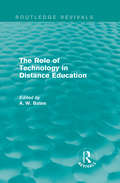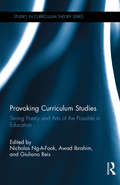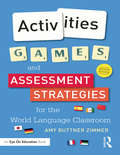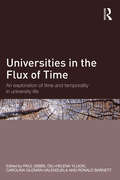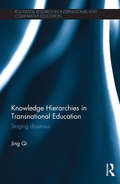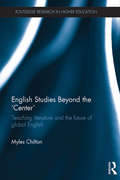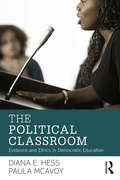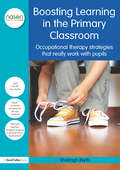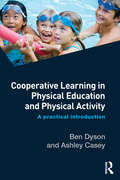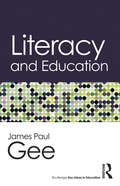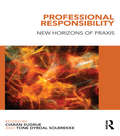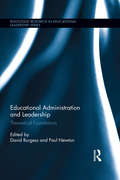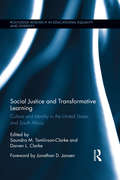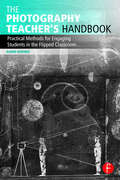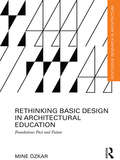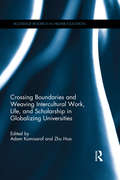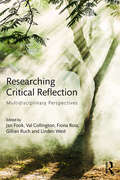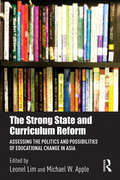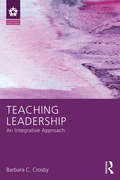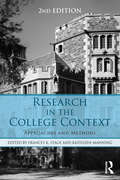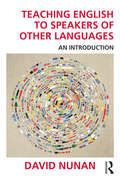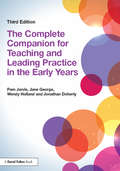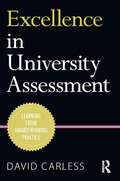- Table View
- List View
The Role of Technology in Distance Education (Routledge Revivals)
by Tony BatesThis book, first published in 1984, provides a comprehensive review of the range of technology that was being used in distance education. Technological developments in word processing, video-disc and viewdata as well as computer-based learning had revolutionised the potential for distance education. These developments required the role of more ’conventional’ distance learning media, such as broadcasting, tuition and text, to be reassessed. This book, written by international experts in the field, explored the state of the art at the time, and also provided their ideas on how future developments were likely to evolve. This book is ideal for those studying education and communications.
Provoking Curriculum Studies: Strong Poetry and Arts of the Possible in Education (Studies in Curriculum Theory Series)
by Nicholas Ng-A-Fook, Awad Ibrahim and Giuliano ReisProvoking Curriculum Studies pushes forward a strong reading of the theoretical and methodological innovations taking place within curriculum studies research. Addressing an important gap in contemporary curriculum studies—conceptualizing scholars as poets and the potential of the poetic in education—it offers a framework for doing curriculum work at the intersection of the arts, social theory, and curriculum studies. Drawing on poetic inquiry, psychoanalysis, phenomenology, life writing, and several types of arts-based research methodologies, this diverse collection spotlights the intellectual genealogies of curriculum scholars such as Ted Aoki, Geoffrey Milburn and Roger Simon, whose provocations, inquiries, and recursive questioning link the writing and re-writing of curriculum theory to acts of strong poetry. Readers are urged to imagine alternative ways in which professors, teachers, and university students might not only engage with but disrupt, blur, and complicate curriculum theory across interdisciplinary topographies in order to seek out blind impresses—those areas of knowledge that are left over, unaddressed by ‘mainstream’ curriculum scholarship, and that instigate difficult questions about death, trauma, prejudice, poverty, colonization, and more.
Activities, Games, and Assessment Strategies for the World Languages Classroom
by Amy Buttner ZimmerThis bestselling book is filled with fun activities you can use to engage students in learning a world language. No matter what language and grade level you teach, you will love having a wide variety of tools at your disposal, from quick warm-up exercises to longer games and group activities. Inside, you’ll find… Essential teacher tools and student organizational tools Strategies to promote and monitor class participation, including student self-assessments Strategies to promote and assess oral proficiency, such as prompts, quick chats, and role plays Warm-up activities and five-minute transitional activities Individual, pair, and group practice activities, with modification suggestions Games that make learning fun, with clear directions for how to do them Great websites and other resources to check out for more ideas The enhanced second edition features updated activities and technology suggestions throughout, as well as a tabbed design so it's easier to return to your favorite sections again and again. Bonus: The book comes with more than 30 templates—charts, rubrics, and game boards that can be photocopied from the book or downloaded as eResources from the book product page at www.routledge.com/books/details/9781138827295. You can modify and print them for classroom use.
Universities in the Flux of Time: An exploration of time and temporality in university life
by Paul Gibbs Ronald Barnett Oili-Helena Ylijoki Carolina Guzmán-ValenzuelaHigher education and the institution of the university exist in time, their essential nature now continually subject to change: change in students, in knowledge, in structure and in their own communities and those they service. These changes are accompanied by a quickening of time, leading to a heightened intensity of academic life. Yet the nature of time in all the contemporary work on the university has been largely overlooked. This is an important omission and Universities in the Flux of Time has gathered leading academics whose contributions to the volume raise a debate as to the influence and use of time in the university. They do this in an exploration of how these changes are perceived in higher education and how these affect its temporality from local, national and global perspectives. By dealing with the time within the university, the book opens new spaces for the development of the university and civic society. The book develops an interdisciplinary understanding of the temporal issues of engaging with the past, present and future of higher education and its institutions, through consideration of the increased speed demanded for the production of able students and innovative research, to the accountability pressures from central governments and commerce. Reflecting on these issues in the higher education sector, Universities in the Flux of Time is split into three parts, with each one addressing time and its multiple relationships with the university: Past, present and future Knowledge and time Living with time This volume will provide essential reading for those on higher education studies courses as well as a wider audience of managers, practitioners, policy makers, academics and students and from many disciplinary perspectives including sociology, organisation studies, social psychology and the philosophy of education.
Knowledge Hierarchies in Transnational Education: Staging dissensus (Routledge Research in International and Comparative Education)
by Jing QiTransnational education seeks equivalence in standards and/or relevance of outcomes through the transfer of Western theories, concepts and methods. Utilising a critique-interpretative approach, Jing Qi argues that equivalence/relevance-oriented approaches to transnational education assume the legitimacy of the global knowledge hierarchy. Euro-American educational theories are imposed as defaults in non-Western educational communities of imagined consensus. Grounded in a study of a five-year transnational teacher education and community capacity-building program in Northern Chile, the book investigates the relationships between theoretical knowledge, knowledge hierarchies and critique. Transnational education communities are recognised as sites of critiques where conflictual and conceptual ‘dissensus’ disrupts global and local knowledge hierarchies. Critique is deployed by educational actors in their everyday engagement in transnational education to stage dissensus, which constantly re-draws the lines of possibility for knowledge co-construction. A matrix mapping system is designed to chart and theorise the Chilean educational actors’ critiques along the trail of concept translation, learning, application and innovation of knowledge hierarchies, which operate at and across global, transnational, local and the newly-created local-global levels. This book examines how these critiques modulate the ascendancy of knowledge hierarchies to enfranchise non-western educational actors for theoretical knowledge production that addresses local needs. Knowledge Hierarchies in Transnational Education will be of key value to researchers, academics and postgraduate students in the fields of international education, teacher education and globalisation.
English Studies Beyond the 'Center': Teaching literature and the future of global English (Routledge Research in Higher Education)
by Myles ChiltonThis book addresses the shape of English studies beyond the ‘center’ by analyzing how the discipline has developed, and by considering how lessons from this analysis relate to the discipline as a whole. The book aims to open a cross-disciplinary conversation about the nature of the English major in both non-Anglophone and Anglophone countries by addressing the tensions between language and literature pedagogy, the relevance of a focus on hyper-canonical Anglophone literature in a world of global Englishes, world literature, and multilingual students, and by reflecting on the necessary contingency and cross-purposes of blended literature and language classrooms. Many of the book’s points of discussion arise from the author’s experience as an English professor in Japan, where the particularities of English language and literature pedagogy raise significant challenges to Anglo-centric critical and pedagogical assumptions. English Studies Beyond the ‘Center’: Teaching Literature and the Future of Global English therefore argues that English literature must make a case for itself by understanding its place in a newly configured discipline. Issues discussed in the book include: English language and literature pedagogy in Japan The modes through which EFL and English literary studies converge and diverge Globalized English beyond the Anglo-American perspective English classroom practices, particularly in Japan
The Political Classroom: Evidence and Ethics in Democratic Education (Critical Social Thought)
by Diana E. Hess Paula McAvoyWINNER 2016 Grawemeyer Award in Education Helping students develop their ability to deliberate political questions is an essential component of democratic education, but introducing political issues into the classroom is pedagogically challenging and raises ethical dilemmas for teachers. Diana E. Hess and Paula McAvoy argue that teachers will make better professional judgments about these issues if they aim toward creating "political classrooms," which engage students in deliberations about questions that ask, "How should we live together?" Based on the findings from a large, mixed-method study about discussions of political issues within high school classrooms, The Political Classroom presents in-depth and engaging cases of teacher practice. Paying particular attention to how political polarization and social inequality affect classroom dynamics, Hess and McAvoy promote a coherent plan for providing students with a nonpartisan political education and for improving the quality of classroom deliberations.
Boosting Learning in the Primary Classroom: Occupational therapy strategies that really work with pupils (nasen spotlight)
by Sheilagh BlythBoosting Learning in the Primary Classroom is your one-stop practical guide to understanding the physical development of children and how this affects their ability to learn. Not only does it explain the reasons behind the theories but provides over 75 practical tips that really work in the classroom. The book is based on a successful five-step approach to help children acquire the skills needed to manage at school and daily life. It works by being able to pinpoint a problem, assists others in recognising the impact that difficulty is having to the child and then provides strategies to develop that child’s specific skills. Using the latest medical research and established occupational therapy techniques to obtain great results, this approach provides teachers with the tools to use different knowledge and strategies to engage children in the learning process. Key ideas explored include: Exploring the reasons for poor handwriting Increasing Disability Awareness The link between body posture and concentration Dyspraxia in a school setting Play develops learning Understanding sensory behaviour By providing teachers with an understanding of physical child development and the impact this has in the classroom, this book demonstrates how teachers can use this knowledge to boost the learning of their primary-aged children. It encourages teachers to identify improvements in the child’s progress of not just educational learning targets but also in physical motor development, using real life case studies, latest theory and tried & tested occupational therapy methods to help every child improve.
Teachers and Academic Partners in Urban Schools: Threats to professional practice (Teacher Quality and School Development)
by Lori Beckett'Showing how critical thinking and local democracy can be a spur to very real educational development within schools that are facing severe challenges, this book provides us with one very valuable contemporary resource of hope.' Ian Menter, Professor of Teacher Education, University of Oxford, UK Teachers and Academic Partners in Urban Schools identifies and addresses a major problem for practitioners – teachers, student teachers and teacher educators – working in urban schools burdened by highly restrictive teaching methods and pressures to meet unrealistic benchmarks set by government. In this book, Lori Beckett investigates how to negotiate these tensions and challenges and offers an account of how to elevate practitioners’ professional voice on quality teaching along more democratic lines. The book addresses key issues for teachers in urban schools, such as: fractures in teachers’ professional communities; impacts of imposed marketizing policies and forced performative practices on schools; the complexities of teaching and teachers’ concerns about practice, as well as teaching practitioners’ perception of educational/schools policy. Both academic and teacher partners contribute to the work, showcasing the ways they have engaged with each other in joint work and with local government. Through this, the book supports a professional and politicized dialogue about teaching and teacher education, offering a meaningful account of how to fashion a form of educative schooling for students and families with complex needs. Written by a dynamic and experienced author, this book brings Beckett’s experience to bear on a controversial and complex area – addressing the general trend towards increased regulatory policy in education. It is an essential read for anyone interested in a rich analysis of how practitioners can work to reassert their professional voice and regain control of schools and teacher education, and will also appeal to those interested in the larger project of restoring school democracy.
Cooperative Learning in Physical Education and Physical Activity: A Practical Introduction
by Ashley Casey Ben DysonThis book introduces Cooperative Learning as a research-informed, practical way of engaging children and young people in lifelong physical activity. Written by authors with over 40 years’ experience as teachers and researchers, it addresses the practicalities of using Cooperative Learning in the teaching of physical education and physical activity at any age range. Cooperative Learning in Physical Education and Physical Activity will help teachers and students of physical education to master research-informed strategies for teaching. By using school-based and real-world examples, it allows teachers to quickly understand the educational benefits of Cooperative Learning. Divided into four parts, this book provides insight into: Key aspects of Cooperative Learning as a pedagogical practice in physical education and physical activity Strategies for implementing Cooperative Learning at Elementary School level Approaches to using Cooperative Learning at Middle and High School level The challenges and advantages of practising Cooperative Learning Including lesson plans, activities and tasks, this is the first comprehensive guide to Cooperative Learning as a pedagogical practice for physical educators. It is essential reading for all students, teachers and trainee teachers of physical education and will also benefit coaches, outdoor educators and people who work with youth in the community.
Routledge Encyclopaedia of Educational Thinkers
by Joy A. Palmer CooperThe Routledge Encyclopaedia of Educational Thinkers comprises 128 essays by leading scholars analysing the most important, influential, innovative and interesting thinkers on education of all time. Each of the chronologically arranged entries explores why a particular thinker is significant for those who study education and explores the social, historical and political contexts in which the thinker worked. Ranging from Confucius and Montessori to Dewey and Edward de Bono, the entries form concise, accessible summaries of the greatest or most influential educational thinkers of past and present times. Each essay includes the following features; concise biographical information on the individual, an outline of the individual’s key achievements and activities, an assessment of their impact and influence, a list of their major writings, suggested further reading. Carefully brought together to present a balance of gender and geographical contexts as well as areas of thought and work in the broad field of education, this substantial volume provides a unique history and overview of figures who have shaped education and educational thinking throughout the world. Combining and building upon two internationally renowned volumes, this collection is deliberately broad in scope, crossing centuries, boundaries and disciplines. The Encyclopaedia therefore provides a perfect introduction to the huge range and diversity of educational thought. Offering an accessible means of understanding the emergence and development of what is currently seen in the classroom, this Encyclopaedia is an invaluable reference guide for all students of education, including undergraduates and post-graduates in education or teacher training and students of related disciplines.
Literacy and Education: Ideology In Discourses (Routledge Key Ideas in Education)
by James Paul GeeLiteracy and Education tells the story of how literacy—starting in the early 1980s—came to be seen not as a mental phenomenon, but as a social and cultural one. In this accessible introductory volume, acclaimed scholar James Paul Gee shows readers how literacy "left the mind and wandered out into the world." He traces the ways a sociocultural view of literacy melded with a social view of the mind and speaks to learning in and out of school in new and powerful ways. Gee concludes by showing how the very idea of "literacy" has broadened into new literacies with words, signs, and deeds in contexts enhanced, augmented, and transformed by new technologies.
Professional Responsibility: New Horizons of Praxis
by Ciaran Sugrue Tone Dyrdal SolbrekkeWhat does professional responsibility entail in an increasingly insecure, unpredictable and de-regulated world? This is the core question addressed in this text. The point of departure for the various contributions is that professional responsibility is a way of being in the world that includes a particular mandate – to behave in a manner consistent with moral and societal obligations as a professional. Increasingly, however, there is a lack of consensus as to what such mandates imply, and even more dissensus as to what appropriate exercise of responsibility entails. One of the distinctive features of this book is the manner in which it combines normative and empirical dimensions. It moves beyond dualistic perspectives to create a more inclusive conversation on professional responsibility. In the face of increasing complexity of professional work, professional responsibility remains open to further development. The book signals direction for the development of professional responsibility, and while seeking to give direction to ongoing deliberations avoids the pitfalls of performativity. The chapters are grounded in a variety of disciplinary perspectives and traverse various professional boundaries in a self-reflexive manner to create more inclusive, transformative and generative narratives on professional responsibility. This is achieved by: Focusing on normative dimensions of professional work and combining these with a focus on empirical aspects of professional practice in a variety of setting, and Recognising the inevitable tensions between personal trust and responsibility, and largely depersonalised policies and strategies of quality control when normative and empirical aspects of professional responsibility are situated within their policy environments. The concluding narrative moves beyond deconstruction, complexity and critique of these considerations to a construction of new imagined horizons of professional responsibility from theoretical, conceptual and practical perspectives. This text sets out to transform professional responsibility through a re-configuration of its constituent elements in imaginative and creative ways and by indicating the ‘real world’ import of re-charting the field.
Educational Administration and Leadership: Theoretical Foundations (Routledge Research in Educational Leadership)
by David Burgess Paul NewtonThis volume provides diverse perspectives and paradigms in educational administration and leadership. Focusing on particular philosophical and theoretical schools of thought, it traces the contemporary history of debates in the field while also exploring emerging, non-traditional schools for insight and potential contributions to educational administration in multi-cultural contexts. It critically examines trends and issues in society and their impact on educational theory, and gives an overview of the scholarly study of organizations, administration, and leadership to develop introductory understandings of significant concepts and theories.
Social Justice and Transformative Learning: Culture and Identity in the United States and South Africa (Routledge Research in Educational Equality and Diversity #6)
by Saundra M. Tomlinson-Clarke Darren L. ClarkeThe similarities between the United States and South Africa with respect to race, power, oppression and economic inequities are striking, and a better understanding of these parallels can provide educational gains for students and educators in both countries. Through shared experiences and perspectives, this volume presents scholarly work from U.S. and South African scholars that advance educational practice in support of social justice and transformative learning. It provides a comprehensive framework for developing transformational learning experiences that facilitates leadership for social justice, and a deeper understanding of the factors influencing personal, national and global identity.
The Photography Teacher's Handbook: Practical Methods for Engaging Students in the Flipped Classroom (Photography Educators Series)
by Garin HornerThe Photography Teacher’s Handbook is an educator’s resource for developing active, flipped learning environments in and out of the photo classroom, featuring ready-to-use methods to increase student engagement and motivation. Using the latest research on the cognitive science of effective learning, this book presents groundbreaking strategies to inspire students to collaborate, explore, and internalize photographic principles and concepts. The innovative practices in this book reimagine the traditional, scholarly pedagogy into a dynamic, teacher-guided, learner-centered approach. Key features include: Step-by-step instructions that explain how and why to flip a photography classroom Hands-on exercises and activities to help students take charge of their learning experience Practical advice from more than 100 respected photography educators An interactive companion website with informative videos, links, and resources for students and educators alike
Rethinking Basic Design in Architectural Education: Foundations Past and Future (Routledge Research in Architecture)
by Mine OzkarRethinking Basic Design in Architectural Education provides historical and computational insights into beginning design education for architecture. Inviting the readers to briefly forget what is commonly known as basic design, it delivers the account of two educators, Denman W. Ross and Arthur W. Dow, from the turn of the twentieth century in Northeast America, interpreting key aspects of their methodology for teaching foundations for design and art. This alternate intellectual context for the origins of basic design as a precursor to computational design complements the more haptic, more customized, and more open-source design and fabrication technologies today. Basic design described and illustrated here as a form of low-tech computation offers a setting for the beginning designer to consciously experience what it means to design. Individualized dealings with materials, tools, and analytical techniques foster skills and attitudes relevant to creative and technologically adept designers. The book is a timely contribution to the theory and methods of beginning design education when fast-changing design and production technology demands change in architecture schools’ foundations curricula.
Crossing Boundaries and Weaving Intercultural Work, Life, and Scholarship in Globalizing Universities (Routledge Research in Higher Education)
by Zhu Hua Adam KomisarofThis book generates a fresh, complex view of the process of globalization by examining how work, scholarship, and life inform each other among intercultural scholars as they navigate their interpersonal relationships and cross boundaries physically and metaphorically. Divided into three parts, the book examines: (1) the socio-psychological process of crossing boundaries constructed around nations and work organizations; (2) the negotiation of multiple aspects of identities; and (3) the role of language in intercultural encounters, in particular, adjustment taking place at linguistic and interactional levels. The authors reflect upon and give meaning and structure to their own intercultural experiences through theoretical frameworks and concepts—many of which they themselves have proposed and developed in their own research. They also provide invaluable advice for transnational scholars and those who aspire to work and live abroad to improve organizational participation and mutual intercultural engagement when working in a globalizing workplace. Researchers and practitioners of applied linguistics, communication studies, and higher education in many regions of the world will find this book an insightful resource.
Researching Critical Reflection: Multidisciplinary Perspectives
by Jan Fook Gillian Ruch Fiona Ross Val Collington Linden WestCritical reflection helps professionals to learn directly from their practice experience, so that they can improve their own work in an ongoing and flexible way – something essential in today’s complex and changing organisations. It allows change to be managed in a way which enables individuals to preserve a sense of what is fundamentally important to them as professionals. It is particularly important as it can also help make sense of some fundamental issues, and so also has implications for how we live our lives. However, more systematic research on critical reflection is needed to help us understand what works best for professionals in different settings. This timely work explores how critical reflection is researched, evaluated and used as a research method itself, with the aim of improving how it is taught and practised in a rigorous and transferable way. Developing a more comprehensive and multi-disciplinary view of the current state of critical reflection and the research directions which need to be taken, the book is divided into four parts. It: - Provides an overview of different perspectives on critical reflection and stimulates dialogue between them - Establishes some common platforms from which to develop further research directions - Identifies the major issues in evaluating critical reflection teaching, and main methods for doing so - Contributes to social science methodological innovations by exploring how methods based on critical reflection can be used for researching professional practice - Contains contributions from academics who are internationally known and highly experienced in different aspects of critical reflection. Researching Critical Reflection is an important reference for all students, practitioners, and researchers – including in the areas of education, management, health and social work – who engage with critical reflection to develop their practice.
The Strong State and Curriculum Reform: Assessing the politics and possibilities of educational change in Asia (Routledge Research in Education Policy and Politics)
by Michael W. Apple Leonel LimAs Asian education systems increasingly take on a stronger presence on the global educational landscape, of special interest is an understanding of the ways in which many of these states direct their schools towards higher achievement. What is missing, however, are accounts that take seriously the particular construction of the strong, developmental state witnessed across many Asian societies, and that seek to understand the politics and possibilities of curriculum change vis a vis precisely the dominance of such a state. By engaging in analyses based on some of the best current social and cultural theories, and by illuminating the interactions among various state and non-state pedagogic agents, the chapters in this volume account for the complex post-colonial, historical and cultural consciousnesses that many Asian states and societies experience. At a time when much of the educational politics in Asia remains in a state of transition and as many of these states seek out through the curriculum new forms of social control and novel bases of political legitimacy, such a volume offers enduring insights into the real if not also always relative autonomy that schools and communities maintain in countering the hegemonic presence of strong states.
Teaching Leadership: An Integrative Approach (Leadership: Research and Practice)
by Barbara C. CrosbyTeaching Leadership provides guidance for leadership educators in a variety of organizational and community contexts and across academic disciplines. An experienced leadership educator, Crosby promotes an inclusive vision of leadership that recognizes the inherent leadership potential in everyone. Featuring interviews with 25 respected leadership educators, Teaching Leadership complicates and enriches the leader-follower dichotomy to advance a holistic and practice-oriented model of leadership education. Using the metaphor of ‘heart, head, and hands,’ Crosby shows how authentic leadership is an embodied practice based equally in emotional, intellectual, and experiential learning.
Research in the College Context: Approaches and Methods
by Kathleen Manning Frances K. StageResearch in the College Context, 2nd Edition provides faculty, students, practitioners, and researchers in the college environment with a manual of diverse approaches and methods for researching higher education and college students. The text offers the reader a variety of qualitative and quantitative research tools including interviewing, surveys, mixed methods, focus groups, visual methods, participatory action research, policy analysis, document analysis and historical methods, secondary data analysis, and use of large national data sets. This revised edition provides readers with current and innovative methodological tools needed to research the complex issues facing higher education today. Each technique is thoroughly presented with accompanying examples, advice for designing research projects, and tips for data collection, analysis, and dissemination of results. Clearly organized and accessible, this volume is the essential guide for experienced and novice researchers.
Teaching English to Speakers of Other Languages: An Introduction
by David NunanDavid Nunan's dynamic learner-centered teaching style has informed and inspired countless TESOL educators around the world. In this fresh, straightforward introduction to teaching English to speakers of other languages he presents teaching techniques and procedures along with the underlying theory and principles. Complex theories and research studies are explained in a clear and comprehensible, yet non-trivial, manner without trivializing them. Practical examples of how to develop teaching materials and tasks from sound principles provide rich illustrations of theoretical constructs. The content is presented through a lively variety of different textual genres including classroom vignettes showing language teaching in action, question and answer sessions, and opportunities to 'eavesdrop' on small group discussions among teachers and teachers in preparation. Readers get involved through engaging, interactive pedagogical features and opportunities for reflection and personal application. Each chapter follows the same format so that readers know what to expect as they work through the text. Key terms are defined in a Glossary at the end of the book. David Nunan's own reflections and commentaries throughout enrich the direct, up-close style of the text.
The Complete Companion for Teaching and Leading Practice in the Early Years
by Jonathan Doherty Jane George Pam Jarvis Wendy HollandPreviously published as The Early Years Professional's Complete Companion, this new edition has been thoroughly updated and is the essential resource for aspiring and existing leaders of early years practice. Covering a wide range of theoretical and practical concepts, this book helps the reader consider how they can develop excellent practice within their unique setting. Divided into three distinct sections, the book begins by exploring the origins of early years practice, before discussing principles in development, social policy and child protection. The second section considers what constitutes high quality practice, and reflects on the role of emotional security, environment, and adults in shaping children's learning and development. The third and final section examines how activities associated with continued professional development impact on teaching standards, before finishing with a discussion on international perspectives on early years practice. Key features include: New chapters on safeguarding, children's rights, continuous professional development and international perspectives of early years practice. Chapter objectives, tasks and links to the Early Years Foundation Stage. Case studies with questions for reflection to promote critical thinking. New developments in the early years practice arena are outlined, including the emergence of Early Years Teacher Status (EYTS). This book is an essential text for those working towards qualifications in early years teaching and leading practice, and provides a flexible basis for tutors, trainers, assessors and mentors to further develop programmes of education and training. It will also appeal to teachers and practitioners interested in considering potential routes for continuing their professional development.
Excellence in University Assessment: Learning from award-winning practice
by David CarlessAssessment in higher education is an area of intense current interest, not least due to its central role in student learning processes. Excellence in University Assessment is a pioneering text which contributes to the theory and practice of assessment through detailed discussion and analysis of award-winning teaching across multiple disciplines. It provides inspiration and strategies for higher education practitioners to improve their understanding and practice of assessment. The book uses an innovative model of learning-oriented assessment to analyze the practice of university teachers who have been recipients of teaching awards for excellence. It critically scrutinizes their methods in context in order to develop key insights into effective teaching, learning and assessment processes. Pivotal topics include: Competing priorities in assessment and ways of tackling them; The nature of quality assessment task design; The student experience of assessment; Promoting student engagement with feedback. An indispensable contribution to assessment in higher education, Excellence in University Assessment is a valuable guide for university leaders, middle managers, staff developers, teachers and researchers interested in the crucial topic of assessment.
